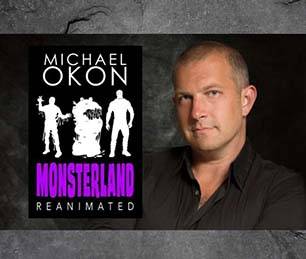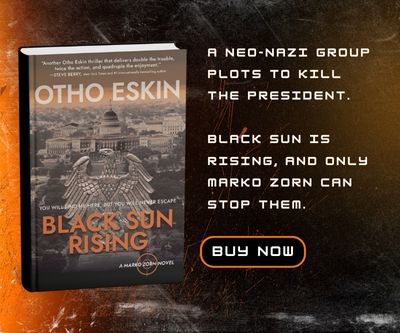When you write a novel that centers around an amusement park where guests interact with vampires, are chased by werewolves and walk among zombies, don’t expect to get off so easily.
Michael Okon had a lot of cleaning up to do since the end of his weird and wacky Monsterland. The sequel, Monsterland Reanimated (Wordfire Press), is aptly named. Many creatures and villains you so lovingly met in book one have been restored to life and given fresh vigor, which they use in the continued quest of their sinister leader, Vincent Konrad, to achieve world dominance.
This is nothing like your standard fare. Welcome to Okon’s world, where unusual characters, venues and situations are the norm.
Okon is an award-winning and bestselling author whose work spans several genres: paranormal, thriller, horror, action/adventure and even self-help. From the time he saw the movie Goonies, he has been hooked on the idea of entertaining people through unforgettable stories.
Once again, in Monsterland Reanimated, Okon’s imagination runs wild with a zany plot, fast-paced writing, and a unique blend of gore and sarcasm. And once again, it works for the reader.
“People can identify with my characters, because I have a familiar yet very different set of rules for each of them,” Okon said in a recent BookTrib interview. That seems to hold true — whether they are man or monster.
BookTrib recently caught up with the author to discuss his work and where his ideas come from.
An amusement park with monsters. An agency that protects witches in Witches Protection Program. A demon holding a dead wife’s spirit hostage in Stillwell. Where do you come up with this stuff?
Movies. I love taking an existing idea and mashing it up. Monsterland was simply me watching Jurassic Park with my kids and I literally just asked, “Why isn’t there a theme park with monsters?” Hollywood has a rule — give me the same thing, but make it different. That’s exactly what I do with all my stories.
Your work exhibits a fascination with paranormal thrillers and horror. How did you gravitate to these subjects?
I’m a huge believer in spirituality and the afterlife. I firmly believe we are souls having a human experience. The evidence of this is too overwhelming. If that’s the case, and we are just wearing these “meat suits” for a limited time on earth, that opens us up to unlimited possibilities as to who we are.
Focusing on paranormal allows me to play in the spiritual sandbox about what exists beyond the grave. Do we carry our personalities with us when we cross over? What’s the point of learning things as a human? These are questions that cross my mind all day. And when you add in a touch of horror, it makes for a page-turning read. Paranormal and horror go hand-in-hand like meat and potatoes.
When you talk about monsters, witches and spirits, does that give you license to make up situations as you go along without needing to conform to rules or boundaries?
Every story I write, the first thing I put down on is the rules of that universe. I will never just write and figure it out from there. I have to know the sandbox my characters are playing in. The rules are mine because it’s my story, but I try to keep true to the folklore of that creature.
For example, in Monsterland, I basically humanize the monsters and monsterize the humans. The vampires are not blood-sucking monsters. They are humans that crave blood through a sexually transmitted disease. You can get bit by a vampire, but you won’t become a vampire. It’s when you have a one-night stand with an actual vamp; then you will become one.
Same the werewolves. Werewolves are terrorizing creatures in folklore that come out during full moons and feast on humans. I made the werewolves more benign. More victims then villains. They escaped their towns and live remotely in the Everglades, feasting on alligators. My werewolves don’t want to harm humans because they are human.
Is there some overarching message in your work about people being placed in scary situations to help them overcome their fears? Or is it all just for fun?
There is always a message in my works; however, there are three essential elements in a standard “Monster in the House” story that must be there to make the story relatable and able to work. We need a monster. That’s a given. Some vicious, misunderstood thing that wants to eat/kill/maim the main characters. We need a house. A place where our beloved heroes cannot leave. They cannot say “Check please!” and take the train to the next town. And finally, in order for the monster to be unleashed, we need a sin. Perfect example: the sin in Jaws is keeping the beaches open during Fourth of July week to make money, knowing there’s a killer shark in the water. The shark wouldn’t kill if our players did the right thing and closed the damn beaches. I use these three elements to tell a classic horror story. Nothing is just for fun.
Your books are relatively short, yet they carry out brisk, compelling storylines from beginning to end. Why did you choose a shorter format for your novels?
I can’t write an 800-page novel with 50 pages of it describing a door. I believe we are in an age where short content is king. Most people don’t have time or patience to read huge, drawn out novels. But if you want entertainment for a few nights, then yes, I think a 200-page book is perfect.
Does the shorter length affect your ability to develop characters?
Character development is key, but I feel the character arc is more important. It’s easy to say where a character has come from, what makes them tick, what fears they have. However, I want to know how this character is going to overcome those fears. What obstacles can I put in their way, and how the hell are they going to get out of it? It’s easy to go deep into character and get lost by never getting to the point. But explaining a few pages about the character’s past then testing that character in a ridiculous setting is what makes them develop into the hero we are reading about.
You are a lifelong movie buff. What movies have been influential to you in your writing?
Here area few in no particular order: The Goonies, Back to the Future, There Will Be Blood, Lord of the Rings, Empire Strikes Back, Rounders, Jurassic Park, Inglorious Bastards, Pulp Fiction, Django Unchained, Reservoir Dogs, Moana, Monsters Inc., Tremors, Jaws, Creature from the Black Lagoon, Dracula, Frankenstein, Gremlins, The Shining, 2001: A Space Odyssey, Willy Wonka and the Chocolate Factory, The Magnificent Seven, and Indiana Jones.
Any new books in the works?
I’m working on a new book called Inheritance. A young girl is invited to her dead billionaire uncle’s will reading, and the inheritance is not what anyone would expect.
—
Learn more about Okon on his BookTrib author page and read our reviews of his novels in the related posts below.
Related Posts
Fighting Magic Fire with Magic Fire in the “Witches Protection Program” by Jim Alkon
Humanizing Monsters and Monsterizing Humans in “Monsterland” by Jim Alkon
Michael Okon Scares Again in “Monsterland Reanimated” by Jim Alkon
https://booktrib.com/wp-content/uploads/2019/02/michael-okon-300×300-1.jpg
About Michael Okon:
Michael Okon is an award-winning screenwriter and novelist. He’s written nine books including the bestselling Brood X, Stillwell, Monsterland, Witches Protection Program, The Flip, The After House and Battle for Darracia series. He resides on the North Shore of Long Island, NY. He writes full-time, with his screaming kids in the background.




